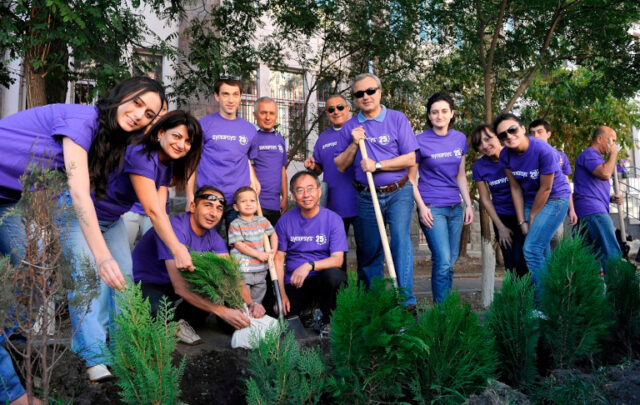
Cecile Andrews has been engaged with New Dream for many years through her work on consumerism. Her first book, The Circle of Simplicity, focused on the voluntary simplicity movement. A few years later she brought together essays by leaders of the movement in Less Is More.
Now, in her new book Living Room Revolution: A Handbook for Conversation, Community, and the Common Good, Cecile focuses on the need to create a caring, collaborative culture in which people realize that they’re better together. She introduces the idea this month and will follow up in subsequent blogs with concrete steps we can take in our own lives.
For years I’ve talked to people about voluntary simplicity, and for years people have responded with: “What’s that thing you’re involved in—that self-deprivation movement?”
What they’re thinking about, of course, is the imperative to reduce consumerism—something that’s destroying the planet. Unfortunately, instead of seeing this as an opportunity for a richer life, many see it as “self deprivation”!
Of course simplicity is about much more than “cutting back.” It’s “the examined life,” asking ourselves what’s important and what matters. But still, what people hear is: “Deprive yourself! No more fun!”
It’s the cry of a desperate population—one that doesn’t understand what happiness is. But this is where the “new” simplicity comes in. When we first began talking about simplicity, it seemed obvious that Americans were confused about happiness—we have believed that if we get rich, we’ll be happy.
Common sense and the wisdom of the ages have always argued otherwise, but now the research has come pouring in—it’s very clear that, after a certain point, more money doesn’t bring happiness.
So what does? Social ties. Relationships to people. The feelings of love and belonging.
Some of the most persuasive evidence comes to us from the work of Richard Wilkinson and Kate Pickett in their book on wealth inequality, The Spirit Level. They found that the bigger a country’s wealth gap, the more other problems grow—things like mental illness, violence, incarceration, even obesity. The most striking fact, though, is that the wealth gap predicts longevity! Apparently even the rich person in this country doesn’t live as long as the average person in a place like Denmark, where the wealth gap is small. Why? Again, it’s because a wealth gap undermines social cohesion in a society.
 So those of us involved in the simplicity movement have been asking how we can help increase social ties. In my new book, Living Room Revolution, I focus on conversation and community. We’re taking back our living rooms—throwing out the old tyrant TV, and bringing people together in a congenial setting to talk. And of course the “living room” is also symbolic—we’re bringing hospitality and conviviality into any setting we can, increasing conversation and community wherever we can.
So those of us involved in the simplicity movement have been asking how we can help increase social ties. In my new book, Living Room Revolution, I focus on conversation and community. We’re taking back our living rooms—throwing out the old tyrant TV, and bringing people together in a congenial setting to talk. And of course the “living room” is also symbolic—we’re bringing hospitality and conviviality into any setting we can, increasing conversation and community wherever we can.
There’s much evidence that social ties increase an individual’s health and happiness. But they also build civic engagement and a responsive democracy. As Robert Putnam of Bowling Alone says, “The culture in which people talk over the back fence with their neighbors is the culture in which people vote.” As people connect, they begin to care more about each other and are concerned for the common good. As philosopher John Dewey said, “Democracy begins in conversation.”
So how does the “New Simplicity” respond? Well, it’s still vital that we reduce consumerism, but we’re talking about it differently. We explain to people that one way to reduce consumerism is to hang out with friends in a café! Much more fun than an aimless trip to the shopping mall.
And research shows that in a culture in which people spend more time together, there is less consumerism. Not only is hanging out in a café more fun than shopping, but our connectedness makes us feel more secure and we don’t need more stuff to impress people!
Lesson learned? The cure to so many of our problems, particularly consumerism, is more community. When we learn to care for each other, we end up caring for all of life, the planet included. The New Simplicity helps people to realize that we’re better together.
Read more about Cecile Andrew’s books and activities on her website and blog.

Join Get2gether where you’ll have the chance to meet fellow New Dreamers who live near you, join local New Dream Teams, and work together to organize real projects for your community.






